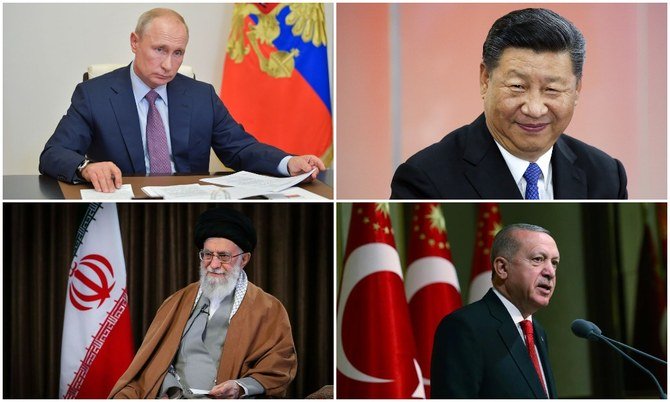
- ARAB NEWS
- 02 Jul 2025

It would be misleading to characterize Iran, Russia, Turkey and China as allies. They are frequently rivals, and on some fronts (Turkey and Russia in Syria and Libya, for example) are effectively enemies. Yet it is fair to describe these states as mutual enablers.
This is because they collectively and aggressively advance their interests through sabotaging global mechanisms of justice and conflict resolution. As permanent members of the UN Security Council, China and Russia habitually shield each other and their allies from the consequences of overseas aggression, domestic repression and arms proliferation. It has consequently been many years since the Security Council has been an effective and relevant body, while related institutions have fallen into decrepitude.
These new “Axis of Evil” states desire to be hegemonic powers — sharing a nostalgia for past eras, when powerful imperialist states devoured the weak — without the niceties of international law or the pretentions of transnational institutions seeking to hold them to account.
Tiny Qatar can’t be a hegemon in its own right, but it can be a banker, facilitator and cheerleader for powers like Turkey. Its propaganda mouthpieces have become almost indistinguishable from Russia Today and Press TV in Iran.
After the fall of communism it was assumed that the globalist liberal/democratic model was in the ascendant; hold-outs such as Saddam’s Iraq and Qaddafi’s Libya would inexorably transform into law-abiding members of the international community. Instead, today it is Western-style democracies on the defensive against pervasive populist and autocratic governing systems.
China, Russia, Turkey and Iran long ago ceased pretending to adhere to rule-of-law norms. Instead they actively propagate these authoritarian, law-subverting tendencies. Just one example is their use of troll farms and cyberwarfare to sabotage democratic processes elsewhere. These asymmetric weapons are an incalculable threat to law-abiding nations with vulnerable critical infrastructure — electricity grids, hospitals, social security systems, air traffic control; witness the bizarre attempts by Russian hackers to steal COVID-19 vaccine research!
These axis states breach international law on so many fronts: China with its onslaughts against Taiwan, Tibet and Hong Kong, expansionism in the South China Sea and attempts to exterminate the Uighur culture and people; Russia and Iran bankrolling insurgencies, subversion and terrorism on almost every continent.
China, Russia, Turkey and Iran long ago ceased pretending to adhere to rule-of-law norms. Instead they actively propagate these authoritarian, law-subverting tendencies.
Baria Alamuddin
While Russia carves out new zones of influence by deploying mercenaries and heavy weaponry, China has created a succession of Asian and Africa dependencies by seducing states into unaffordable infrastructure projects, then offering debt relief in exchange for surrender of sovereignty (handing over ports as naval bases, preferential trade deals, monopolies of mineral resource). Few African states have avoided the attentions of Russia and China, with Moscow extorting lucrative mineral concessions in the Central African Republic, Madagascar, Sudan and South Africa
Iran and Turkey seek every opportunity to make aggressive encroachments against Arab states. Russia and China try having it both ways — exploiting Arab weakness in fragile states to present themselves as the interlocutors of choice for reconstruction projects and arms deals, and an alternative to reliance on the West. After a century in which Western states devised ever-evolving pretexts to dominate the Middle East, let’s not allow subjugation by upcoming powers that don’t even pretend to care about the region’s best interests.
Are Russia and Iran allies? Their collaboration in Syria maintained Assad in power. It suited them both to expose Western and Arab impotence in Syria, but the more both have been drawn into Syria, the more their interests have fundamentally diverged.
Ayatollah Khamenei views Syria as a frontline trench in Iran’s endless conflict with myriad enemies. Putin wants to stabilize Syria as a stepping stone to greater regional influence and prestige. Tehran wants to consolidate its position in southwest Syria in readiness for confronting Israel. Moscow cultivates former rebel elements in this region precisely to minimize Iran and Assad’s influence, while currying favor with Israel. Around Idlib and central Syria, Iran and Russia are allies in countering Turkish incursions; yet at the macro-level, Ankara, Tehran and Moscow share a stake in carving Syria up between them, excluding the Arab world and the West.
These “Axis of Evil” states are thus engaged in a fascinating dance. At one level they depend on one another and derive legitimacy and global clout from that mutual reliance. At another level, they jealously loathe one another and have mutually hostile world views, ceaselessly plotting to constrain one another’s spheres of influence.
The conundrum of this savaging of the rules-based global system is that these states ultimately seek to dominate the same territories — the continent-straddling Silk Road through into the Middle East, with its bountiful resources. We may thus be witnessing the opening skirmishes of an epic struggle for regional supremacy.
The past 70 years have been characterized by low-budget conflicts in impoverished, marginal states — Korea, Vietnam, Yugoslavia, Afghanistan, Africa. Superpowers avoided waging war against each other largely because states were compelled to act within the remits of international law, however tenuously.
As these “Axis of Evil” states rush to upend global norms, they are eviscerating the legal safety barriers that prevent conflict. Better enabling themselves to destroy one another in wars of infinitely greater ferocity than any in living memory.
Vigorously enforced international law is in the interests of even the worst pariah states, if they don’t want to live in a wretched state of perpetual warfare. With millennia of civilization behind them, it is a tragedy that the new imperialists of Persia, China, Russia and Turkey pay so little attention to their rich histories, where they would learn the inevitable fate of those who ride out beyond their own borders to conquer and burn.
(To be continued …)